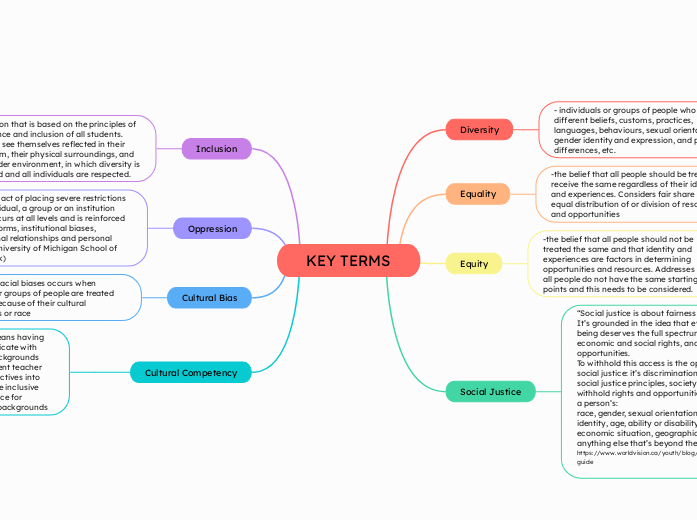KEY TERMS
Diversity
- individuals or groups of people who hold different beliefs, customs, practices, languages, behaviours, sexual orientation, gender identity and expression, and physical differences, etc.
Equality
-the belief that all people should be treated or receive the same regardless of their identities and experiences. Considers fair share as equal distribution of or division of resources and opportunities
Equity
-the belief that all people should not be treated the same and that identity and experiences are factors in determining opportunities and resources. Addresses that all people do not have the same starting points and this needs to be considered.
Social Justice
“Social justice is about fairness in societies. It’s grounded in the idea that every human being deserves the full spectrum of political, economic and social rights, and opportunities.
To withhold this access is the opposite of social justice: it’s discrimination. According to social justice principles, society should never withhold rights and opportunities because of a person’s:
race, gender, sexual orientation, sexual identity, age, ability or disability level, economic situation, geographic location, or anything else that’s beyond their control”
https://www.worldvision.ca/youth/blog/social-justice-guide
Inclusion
- education that is based on the principles of acceptance and inclusion of all students. Students see themselves reflected in their curriculum, their physical surroundings, and the broader environment, in which diversity is honoured and all individuals are respected.
Oppression
“The social act of placing severe restrictions on an individual, a group or an institution [which] occurs at all levels and is reinforced by social norms, institutional biases, interpersonal relationships and personal beliefs.” (University of Michigan School of Social Work)
Cultural Bias
- cultural or racial biases occurs when individuals or groups of people are treated differently because of their cultural backgrounds or race
Cultural Competency
- being culturally competent means having the skills necessary to communicate with people from diverse cultural backgrounds effectively. A culturally competent teacher may incorporate diverse perspectives into their curriculum to foster a more inclusive and enriching learning experience for students from various cultural backgrounds
